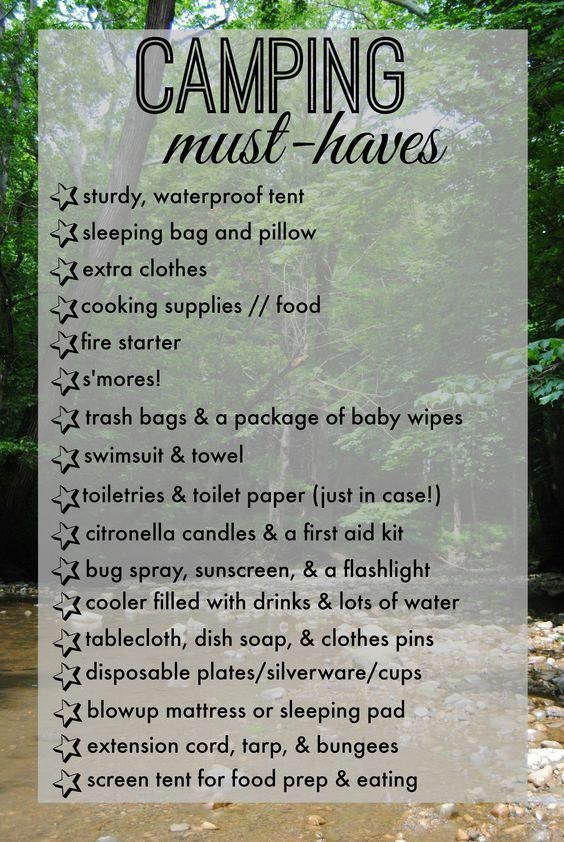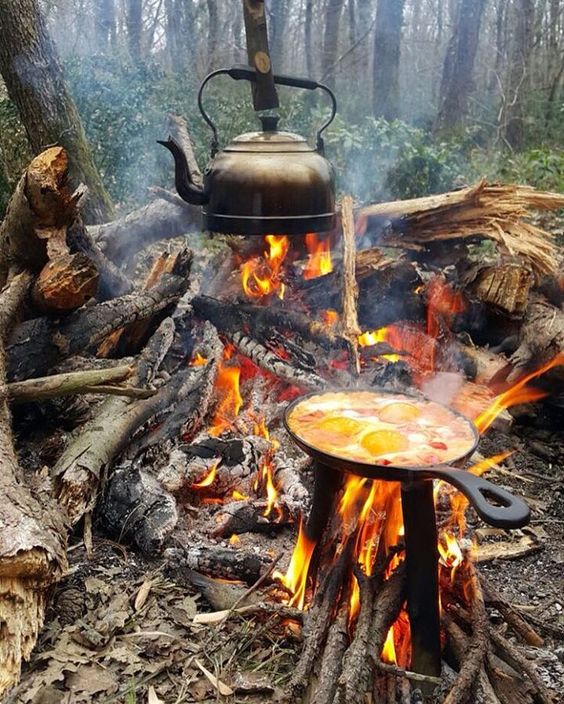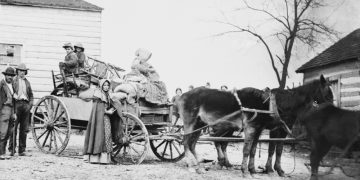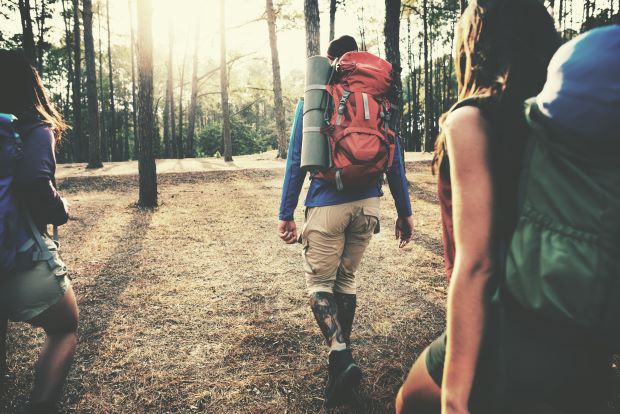Camping is one of the most exciting ways of spending the weekend.
It is something that brings out the best in everybody. If you are fond of adventure, wildlife and nature, then camping expeditions would offer you ample opportunities to do so. Camping is preferred by those who wish to push their limits. It is a great way of testing your patience and existing skill sets.
If you are planning to hit the woods, then preparation will certainly hold the key for you. Going into the woods without adequate preparation can turn out to be fatal. Veteran campers are well aware of the importance of preparation. First-time campers make this mistake quite often. They take things for granted (quite often), this might lead to long-term problems during the course of the trip.
Here is a comprehensive list of things that can be carried along on a camping trip:
- A camping tent
- A sleeping bag and pillows
- Flashlights
- An optimally-sized cooking stove
- A first-aid kit
- A lighter
- A survival knife
- A compass
- A smartphone/cellphone
- A couple of guns with tactical holsters
- Fresh drinking water
- Carry some dry food, such as snacks, breakfast bars, fruits, cereals, etc.
Staying up on your toes holds a lot of importance. You cannot let your guard down at any given point in time.

Some handy stats about camping:
- More than 40 million people in the US, i.e. more than 13% of the
country’s population (aged six and above), camped at least once in 2016.
- The number went up by 0.1% because of the addition of 500,000 new
and/or returning campers.
- These campers spent 587.2 million days in the woods (aggregate),
which means each camper spent 14.5 days (avg) in the woods in 2016.
- The hilly regions of Arizona, New Mexico and Montana saw a higher
rate of participation compared to other regions.
Anxiety problems in campers
Of late, a large number of campers are facing problems, such as anxiety, hypertension, etc. In the last few years, instances of camper anxiety have increased by leaps and bounds. First-time campers find it hard to hold their nerves. Many of them tend to get carried away in a fit of excitement. Consequently, they might end up hitting and/or injuring themselves in the process.
There’s nothing new about anxiety attacks in campers. A large number of camping professionals can be heard voicing concerns over the poor emotional and psychological health of campers.
A number of campers (mostly first-timers) find it hard to get used to the environment. They end up getting overwhelmed. In this way, they end up getting carried away. Well, first-timers cannot be blamed. Anybody who hasn’t ventured into the woods ever is bound to feel overwhelmed and excited. This, at times, ends up causing anxiety attacks.
Camping expeditions are a way of reducing stress and anxiety. If you are experiencing anxiety because of the camping expedition you are about to undertake, then you need to undertake the following:
Connect with a counsellor
This is something that everybody, irrespective of age and experience, can undertake. Quite often, people hesitate to talk about camping-related anxieties. Counselors can be asked to intervene in the situation (it is called redirecting). This is done before establishing a connection with the camper. Take this for an example: many of the camping enthusiasts find it hard to camp alone. In all fairness, you should never camp alone. Those who have this habit of camping alone are bound to feel lonely and depressed.
If you approach a counsellor, he will ask you to carry a few books along. Carrying a few books along is a really good idea. It will help you keep your mind occupied while you are not hunting and/or camping.

Ways to ‘connect’ with the camper:
- Try to
decode the emotions of the camper. Try and ascertain the emotional turmoil he
is facing (sadness, sorrow, frustration, nervousness, etc. ) - Calm him
down by being friendly. (Boy, you’ll be embarking on a camping trip for the
first time ever. It is your time to enjoy, mate. Begin the conversation in a
light-hearted manner ) - Complement
the camper for the effort he’s been making to get things right. (Wow, I am
impressed by the progress you’ve been making. )
Try and address the setback
You can address the setback by making the camper feel better. At times, campers feel better when they speak up. Speaking up and bringing something to light helps lighten their burden. It’s like getting a big overweight monkey off their back.
Here is how you can make things easier for yourself:
The best way to connect is: acknowledge the feeling of the camper who happens to be sitting right in front of you. (I can see how frustrated, angry, demotivated you are)
Acknowledge the situation if you wish to connect a bit more deeply. ( No wonder times have been tough for you owing to…).
- The best way to address a problem is: By motivating the camper.
Tell him that you are quite impressed with the efforts he has been putting
in. This would allow him to look at things in a much more
positive/optimistic way than usual.
- Tone the situation down by making him/her realize that he/she is
not the only one. Tell him that a lot of people have felt this way in the
past. Reassure him that their nothing to worry. Normalise the situation further by
adding personal touch. You can say this: “ I too used to feel the same way
when I was young…”
- Motivate: Nothing works like motivation. Tell them to pump up
their spirits. Motivate them by making them realize that no mountain is
high enough. Ask them not to work themselves too hard. Being harsh will
not help.
Quoting examples can help:
A camper happens to be quite similar to cricketer. Both of them keep pushing their limits in order to attain their goals. Whenever a batsman is facing a fierce bowler, the one who bowls at a 150 clicks, he doesn’t throw away his wicket just because he’s scared. He faces the bowler and goes through the ordeal thinking it is an integral part of a much bigger scheme of things.
Addressing anxiety related to performance
Performance-related anxiety can happen to anybody. No matter how cexp-erienced you are, anxiety can get the better of you if you push yourself too hard.
Try the following tips (as a therapist):
- Share your personal experiences to normalise the
situation a bit - Keep it light. Try to engage the camper in a
light-hearted banter. - Congratulate them on their achievements. I am astounded
to see the things you have accomplished in life. - Again, motivation holds the key. Tell them that they
can achieve what they want to achieve. As a counsellor, you need to
instill a sense of belief within the camper’s mind.
In case of a panic attack
Panic attacks related to camping are quite common in children. Children project their discomfort and fear in the most intense way possible. Do not escalate the problem by mirroring the child’s fears. Try being compassionate instead. Calm the child down by speaking to him/her in a positive manner. Get the child away from all of the chaos. Loud and screeching should be avoided. You can take children to parks and gardens. Make them sit on grass while you’re talking to them.
Here are the steps you can follow:
Remain calm
The first thing you need to do is: stay calm yourself. In this way, you will be able to address the situation in a much better way. The idea is to make the child comfortable. This can only be achieved when you are calm and collected. First and foremost, listen to the child. Listen to what he has to say. Do not bombard him with conclusions.
Acknowledge the problem:
More often than not, children get this feeling that adults aren’t listening to them. There are times when a child feels that his situation is not being taken seriously by adults. These are the times when you need to hold the child together that you are there for him/her.
Final words:
Counselling can help lighten the burden. It can be immensely helpful whilst dealing with emotional turmoil. Camping is no child’s play. It is absolutely fine to speak up. You are bound to feel better when you open up your heart in front of others.
“It is absolutely fine to speak up. It is absolutely fine to say I am not okay.”
Resources
[1] https://lapolicegear.com/holster-finder/
[2] https://outdoorindustry.org/wp-content/uploads/2015/03/2017-Camping-Report__FINAL.pdf





















































































How Much is this Book?
Hello James,
Click on the image-banner at the end of the article and you’ll discover everything you need.
Survivopedia team 🙂
More of a psychology application for campers rather than practical camping skills needed for a Camper to survive and prepare for SHTF situations.
Camping “safe spaces”? Oh yeah, it’s called the Holiday Inn.
I have been camping since a child and never knew this anxiety thing actually exists. The most anxiety I might have is if when on the road, trying to find a campground before dark.
I have to ask, are we so detached from nature people freak out being in nature? Are parents not involved with their children? All mine age 9 to 14 have been camping since they could walk. We have hammock camped, snow cave, debris huts as well as tents and tarps. All kind start a fire with a ferro rod and have their own gear, knifes, cook sets, sleeping bags etc. I guess this just supports my view, I am not too worried about any end of the world event, I am worried about the people I will have to deal with after the event.
Not what I expected 🙁 it should have been titled; What to do when people freak-out while camping. Most people go camping to relax and enjoy themselves. If you never camped before and your worried about anxiety, start small, like in your backyard. Then go to a state park near by. Go on day hikes and watch plenty of videos on camping. If your still nervous about camping invite someone with experience. I will never forget the excitement the first time I went camping as a boy. Freaking out was the last thing on my mind, Tom Sawyer, Huckleberry Finn here I come. People seemed to have lost any sense of being manly (strength or courage). They are like snowflakes drifting in the wind, that will melt as soon as it warms up. The only time I freak-out camping is if there is no toilet paper, I hate using leaves :0
I grew up to camp sleeping on the ground in the wild with no tent and minimal gear. I took a good friend of mine to the desert, it was her first time in a true wilderness and she had a major panic attack. More people than you think suffer from Agoraphobia, the fear of open spaces, and it can be totally non-rational and overwhelming, and quite dangerous. You have to be absolutely calm and in control, and understand that the victim is likely to get even violently angry with you because you’re not reacting to the danger and terror they find in the situation. You have to keep them engaged with you, and be prepared to gently restrain them because they might take off running blindly and hurt themselves. They will hyper ventilate, and it is only your calm and compassion that can salvage the situation.
I have been camping since I can not remember , ran away and set up a campsite in the woods at eight .
Sarah ,
The most important fact you left out and in all the states you mentioned iTIs critical campers be aware of this .
Menstrual cycle .
Wild animals will attack women having, just starting or finishing their period ..
It’s an instinctive survival reaction in them .
I had a friend who trained exotic animals for movies and advertisement,explain this to me .
Young children also . I have seen them pace back and forth never taking their eyes off of a six year old that was visiting the compound .
Rather than a counselor I would suggest an experienced guide. Cheaper and safer .
In college We discussed why women quit hunting with the men at a certain age and started hanging around the cave more .
I suggested they started having periods and a saber tooth was already tough to defend against ;).
A small bag of lime spread around your campsite helps to keep snakes away from your site,crawly critters to .
When you come up on a mountain bull . You should realize he has had some human interaction and to me is more dangerous ,because of .
Keep all food All away from where you sleep and an air horn works magic in an animal meeting .
I recently had a bob cat try to jump me . Sun not quit up and I resting on a big bench rock . It let out a scream 8 to 12 feet behind me . I jumped up and screamed my cat scream .
It started trying to circle me . I am using my flashlight to light up their eyes and throwing rocks. They are growling as they circle . I call my wife and say ,”If you hear all hell break loose. Call 911 and tell them where I am !” Then I sat the phone down and tried to steady my legs. They were doing the elvis pelvis ;).
Got to a better position and waited until full sun up to continue my hike .
Oh, and never show your teeth to a wild animal because to them you are showing aggression .
If anyone is that afraid to go camping – even with other people – they should just stay at home
because they’re not going to enjoy it, and just be a pain-in-the-a__ to everyone else. If they get
through it without a total freak-out, they’ll bore everyone with the tale for years to come.
I’m a city girl, and when I was eight-years-old, I snuck out of bed late one night, and camped alone
with just a tarp, a 21″ X 48″ thin rubber pad, a cigarette lighter, a flashlight, a small Thermos of
milk, and a Clark’s bar (packed in a laundry bag) in Central Park which was just a couple of blocks away from
our apartment.
Picked a spot I knew well from daytime explorations, fell asleep and awoke early the next morning to birdsong and
hunger, returning home before being caught.
(I’d be more scared to do that today – not because I’m 83 – but because the parks were much safer in those days.)
Much as I treasure this memory, which this article has jogged, it has not made me a life-long camper. Yes, I DO prefer
the Holiday Inn and a hot shower. I do however, take day=long hikes, and explore remote areas with some regularity.,
This is the first time I’ve related this “adventure” to anyone, anywhere.